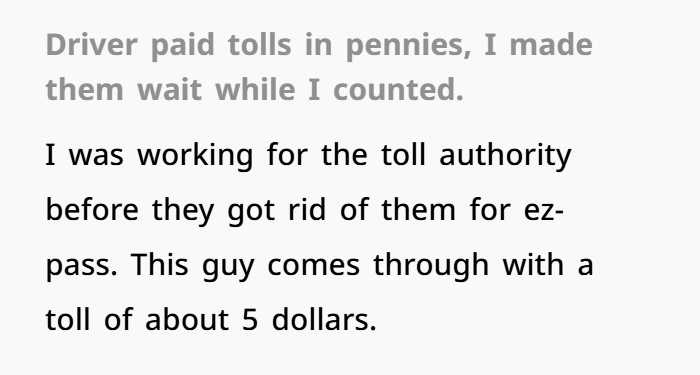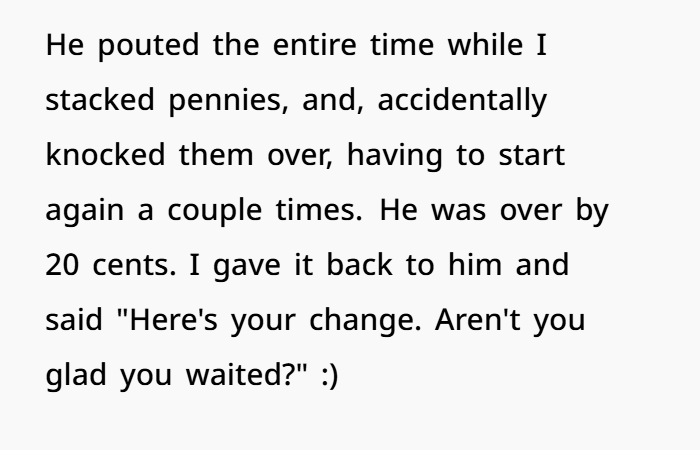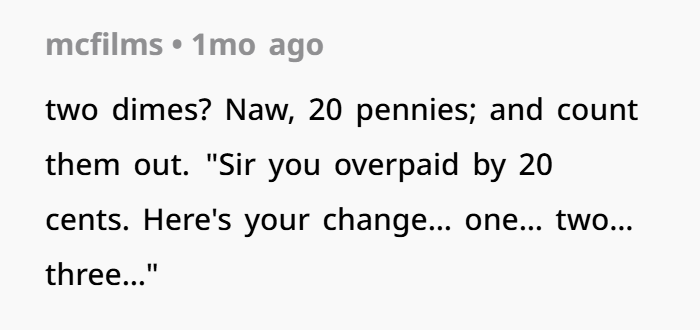Penny-Wise, Time-Foolish: Driver Pays Toll in Coins, Gets a Lesson in Patience
A former toll booth worker recalls a memorable moment of petty revenge during the pre-E-ZPass era. One driver, likely hoping to frustrate the attendant, handed over $5 in small change—mostly pennies and nickels—laughing as he did. But the joke quickly turned when the toll worker made him wait while every last coin was counted, deliberately stacking and restacking to emphasize the pettiness of the gesture. What was intended as a smug act of inconvenience turned into a masterclass in passive-aggressive customer service.
Although no other drivers were delayed due to light traffic, the driver’s plan backfired spectacularly. Not only did he waste more time than he probably bargained for, but he was also handed his 20 cents in change with a cheeky smile and a side of poetic justice.
People who try to inconvenience others may often find themselves on the receiving end of the same treatment

The poster had been working at a tollbooth in the days before people used e-z passes, so people had to pay the toll in cash, and one driver brought $5 in pennies and nickels




When Petty Turns Powerful—The Psychology and Policy Behind Counting Pennies at a Toll Booth
At first glance, this story reads like a classic case of petty revenge: a toll booth worker turning the tables on a smug driver who thought tossing hundreds of pennies would be a clever way to annoy someone. But beneath the chuckles lies a story rich with legal gray areas, behavioral psychology, and the evolving structure of toll road payment systems. In a world increasingly driven by automation and instant transactions, this interaction reminds us of the complex dynamics between workers, drivers, and the systems that govern our roads.
The Legal Tender Dilemma: Can You Actually Pay Tolls in Pennies?
Let’s get one thing straight: U.S. coins and currency are “legal tender for all debts, public charges, taxes, and dues” per 31 U.S. Code § 5103. But here’s the catch—businesses and government entities are not legally required to accept every form of legal tender in any situation.
The U.S. Treasury itself clarifies this on their official website: “There is, however, no Federal statute mandating that a private business, a person, or even a government entity must accept currency or coins for payment.” (source)
In practice, this means toll authorities can technically post signs saying they do not accept coins above a certain quantity. Some toll booths—especially before the EZ-Pass era—had explicit limits (e.g., “no more than 50 coins per transaction”). In this case, the driver may have skirted any posted policies, or the toll authority simply didn’t enforce such limitations.
So, while the driver may have technically paid with legal tender, that doesn’t make his method immune from scrutiny or retaliation—especially not from a worker with the authority to delay or reject his payment method if it disrupted operations.
The Toll Worker’s Discretion and Duty
Toll booth workers—especially before widespread automation—held significant authority in managing lanes, ensuring safety, and verifying payments. While they were trained to handle a range of difficult customer behaviors, the emotional labor they endured was often invisible.
According to the U.S. Bureau of Labor Statistics, toll collectors were often subjected to long hours of repetitive tasks, with customer interaction being the most unpredictable and emotionally taxing aspect of the job (BLS). In that context, being handed hundreds of coins with a smug “enjoy counting” isn’t just a hassle—it’s a subtle form of disrespect.
But what made this moment stand out wasn’t just that the worker counted the pennies. It was that they reclaimed control of the interaction. They reminded the driver that he could be made to wait. That he wasn’t above the system, and in fact, might be beholden to it in the most inconvenient of ways.
Counting Coins as Revenge: A Case of “Benign Retaliation”
This event falls neatly into what psychologists call “benign retaliation”—an act of payback that’s emotionally satisfying but doesn’t cause real harm. It’s the foundation of countless “petty revenge” stories online, especially on Reddit threads like r/pettyrevenge and r/MaliciousCompliance.

Dr. David Chester, a psychology professor at Virginia Commonwealth University who studies aggression and retribution, notes that minor acts of revenge often serve a powerful psychological purpose. “People who exact revenge often feel a rush of satisfaction that restores their sense of control and fairness,” Chester told The Washington Post in a 2021 interview (source).
This toll worker didn’t yell, didn’t refuse the coins, and didn’t escalate. Instead, they followed protocol—slowly, methodically, and with just enough passive aggression to flip the script on the driver. That, in itself, is a rare emotional victory in jobs that often leave workers feeling powerless.
Toll Roads, Road Rage, and the Price of Impatience
In the world of toll collection systems, conflict isn’t uncommon. A 2016 study by the AAA Foundation found that road rage incidents had been on the rise, with aggressive responses to minor inconveniences becoming more frequent (AAA). Toll booths—being bottlenecks—are especially prone to these tensions. The sudden stop, the wait, and the payment all become pressure points.
Toll booth workers have even reported verbal abuse or physical threats, which is one reason many states moved to cashless systems like EZ-Pass or Open Road Tolling. These systems not only cut down on traffic delays but also reduce the emotional and physical risk to workers.
But in the era before automation, this moment—where one person could force another to slow down and wait—had symbolic weight. It was about respect, labor, and dignity. And the driver, by trying to mock the system, underestimated the person behind the booth.
The Rise of Digital Tolls and Decline of the Human Element

It’s worth noting that stories like this are rapidly becoming relics. With the expansion of digital toll systems, cash is increasingly obsolete. According to the International Bridge, Tunnel and Turnpike Association (IBTTA), more than 80% of U.S. toll roads now use electronic tolling, with some states like Florida and Texas aiming to go fully cashless within the next decade (IBTTA).
While this reduces friction, it also removes the human element—and, arguably, the possibility for spontaneous justice or human-to-human accountability. That toll worker’s petty revenge wouldn’t be possible today; the coins would never make it to a person. The driver would simply receive a violation or get sent a bill.
And yet, the memory of that moment—a human interaction defined by wit, patience, and just a touch of sarcasm—lingers. It’s the kind of story that sticks with us because it taps into something universal: the desire to be seen, respected, and not made the butt of someone’s joke, especially while doing your job.
People were extremely satisfied by the toll worker’s petty revenge and felt that the driver deserved it








Dignity in the Details
Whether or not you’ve ever worked a customer service job, most people can relate to the emotional thread running through this story. It’s about boundaries. About how we respond when someone tries to belittle our time, effort, or intelligence. And most importantly, it’s about finding dignity in the small moments—like stacking pennies with care, making a rude man wait, and handing back his 20 cents with a smile.
Because sometimes, justice doesn’t need a gavel. Sometimes, it just needs a toll booth, a slow afternoon, and a mountain of coins.

